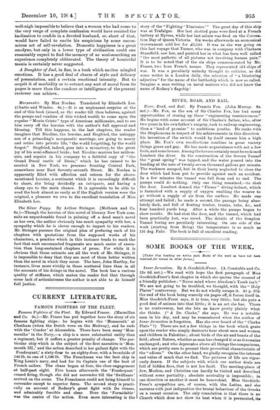Inner Jerusalem. By A. Goodrich-Freer. (A. Constable and Co. 128.
6d. net.)—We read with hope the first paragraph of Miss Goodrich-Freer's first chapter in which she quotes the counsel of a friendly publisher : "Never mind where Absolom's Tomb isn't." We are not going to be troubled, we thought, with the" Holy Places" controversy. But we do not wholly escape it. At p. 372, the end of the book being scarcely six pages off, it forces itself in. Miss Goodrich-Freer says, it is true, very little; but she puts a good deal of animus into that little; it is an art she has. There is no controversy, but she lets us know pretty plainly what she thinks. (" A Dr. Clarke," she says. He was a notable man in his day, and may be remembered when the author of Inner Jerusalem is forgotten. Has she ever heard of the "Clarke Plato" ?) There are not a few things in the book which grate upon the reader who simply desires to hear about men and women and children in Palestine ; about birds of the air and beasts of the field; about Nature, whether as man has changed it or as it remains unchanged; and who deprecates above all things the comparisons, which are pretty sure to present their proverbial characteristic of the "odious." On the other hand, we gladly recognise the interest and value of much that we find. The pictures of life are vigor- ously,drawn. If the subjects with which our author deals are full of hidden fires, that is not her fault. The meeting-place of Jew, Moslem, and Christian can hardly be visited and described without some partiality ; absolute neutrality is impossible ; in one direction or another it must be benevolent. Miss Goodrich- Freer's sympathies are, of course, with the Latins, and she narrates with just indignation the brutal behaviour of the Greeks on a recent occasion. The only consolation is that there is no Church which does not show its best when it is persecuted, its worst when it is in power. Miss Goodrich-Freer knows enough of the history of her own oritmluzion to be aware that it is no exception to the rule. She admires, and with good reason, the pious and single-minded Godfrey ; but does she remember how the streets of Jerusalem ran with Moslem and Jewish blood when Godfrey's followers had at last won their way over its walls?































































 Previous page
Previous page